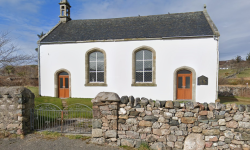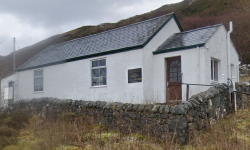Dolina Sutherland of Badcall
Dolina was born in Badcall, Scourie in 1841, the daughter of William and Christian Macleod. She married William Sutherland in Scourie in 1884 and thereafter lived mainly in Lochinver where her husband was a missionary.
Her obituary is given in the Free Presbyterian Magazine, Mar. 1920, Vol 24(10): 335-337.
The late Mrs. William Sutherland, Lochinver
This worthy and excellent old lady died in April, 1919, having reached about fourscore old years. Up to some two or three years ago she was able to move about and attend the house of God – a place it was her intense delight to be in as long as she was able to do so. She was the second wife of the late respected Mr. William Sutherland, who acted as missionary and catechist in the Lochinver district for many years, and of whom an appreciative account appeared in the pages of the Magazine after his death. He was, without doubt, a tower of strength in the early stages of the Free Presbyterian movement, and Dolina, his second wife, the subject of this notice, was characteristically like-minded in the things of God with her gracious husband.
Mrs. Sutherland came under the merciful strivings of the Holy Spirit at a very early age. The circumstance which contributed to move her .spirit relative to the claims of eternity was providential. A brother, older than herself, to whom she was deeply attached, and in whose company she would always be, died. This sad event made the profoundest impression upon her mind, and the solemn consideration of death took a deep hold of her spirit. As she herself put it, on one of the extremely rare occasions on which she became communicative of her own experiences – “It was when my young brother died that my mind was carried into eternity.” Thus, awakened, while a mere girl, she began to propose her own terms and form her own resolutions, in order to prepare for eternity. She set to herself a time limit of three years, In which, if the Lord should spare her, she would be sufficiently prepared, fearing meantime she might die unconverted. The soul which is brought under genuine concern, let it be young or old, endeavours by its own efforts at good works to atone for the past and to pacify the conscience. Conscience, by the illuminating rays which the Holy Spirit sheds into it, begins to assert its proper function, testifying to its personal guilt, and the soul becomes spiritually active; it cannot rest, and need we wonder, when it discovers itself to be a subject of everlasting existence, with the inevitable prospect before it, if it continue unregenerate, of the wrath to come. Let it be noted, she was quite a young girl then, and as to how long she was cleaving to the covenant of works, we cannot say. But she left it on record herself that when she was about fourteen years of age her mother sent her, at the time of a communion, in accordance with time-honoured practice of generosity among Highland people, with some gift in a basket to the Scourie Manse. As she was making her entry by the kitchen door, the late Rev. Mr. Corbett of Kinlochbervie, who was assisting in Scourie on this occasion, met her, and quoted to her the passage in Zechariah, chapter 9 and verse 11: “As for thee also, by the blood of thy covenant I have sent forth thy prisoners out of the pit, wherein is no water.” Naturally abashed and modest-traits of character which she displayed with increasing lustre to the end – she, Nathamel-like, wondered exceedingly at so much attention being bestowed on her by Christ’s servant, and especially at words of Scripture being addressed to her. That evening Mr. Corbett preached from the words which were quoted to young Dolina a few hours previously, and she then thought she closed in with Christ on His own gracious terms. But she used to exclaim, immediately after saying this much of herself, “That is far from being the case with me now.”
Henceforth she became noted among her neighbours, not only for her careful walk and tender conversation, but for her anxiety to attend the means of grace, far and near. In the flourishing days of Dr. Aird, Creich, and Dr. Kennedy, Dingwall, no obstacle, however formidable, would she not endeavour to surmount-and her effort was always attended with success-in order to be present at those memorable Sacramental gatherings in Ross and Sutherland, in which these famous ministers played so eminent and acceptable a part. As an instance, while she was scarcely twenty years old, of her predominant purpose to be at the Sacrament in Creich – long and tedious though the distance was – she enlisted the services of the young women of Badcall at harvest-time, and, thus reinforced, would gather in the corn through the moonlight nights, so as to be able, without hindrance, to proceed to the communion. It strikes us that, her humility and modesty being what they were, she would get her girl friends to help her gathering in the corn under the moonlight, so as not to be seen.
To her, it mattered not whether she would walk the dreary distance of forty or fifty miles, or take the mail coach. In any case, the want of a conveyance would not keep her back. Dr. Kennedy, of all ministers she knew and heard, was her noted and unequalled favourite. One so fitted and qualified in every respect as Dr. Kennedy ,could not fail being a nursing father to the young Christian, ,and the latter, at the most impressionable and formative period of life, was bound to find such’ a preacher a veritable gift from heaven, or, as one speaking in Christ’s stead. The benefit derived would never be forgotten, and the impression made would be indelible. At the mere mention of the eminent preacher’s name, her countenance was wont to brighten up, as the past was conjured up before her mental gaze. Dr. Kennedy had the wonderful spiritual vision and the faculty of expressing in remarkable detail, in the choicest language, the almost limitless variety of spiritual experiences of his numerous hearers, composed of the children, the young men, and the fathers of God’s family. Everyone got his own peculiar case unfolded at some time or another, and thus food convenient was provided for all.
Of all we knew, Mrs. Sutherland may be said to have excelled in the Christian virtues of humility and modesty. Fearful and cautious of putting herself forward, or taking a place which did not belong to her, she would upbraid herself in the most self-denying terms for the fewest remarks she would utter in the presence of others – remarks which, under the closest examination, were absolutely free of anything harsh or offensive. She looked, in fact, on all others professing Christ in sincerity as far excelling herself, and yet everyone gave precedence to her for holiness of heart, walk and conversation. Very deep was her knowledge of the evil heart of unbelief which is so ready to depart from the living God. This, indeed, kept her in constant fear, and in conscious dependence upon the grace of God. Like others, her experience varied and alternated between the hope and assurance that arise from enjoying tokens of His favour, and the mistrust and depression, resulting from hardness of heart, unspirituality of mind, and distance from God. Always straightforward, she placed the claims of truth and righteousness above every human consideration and expediency. She identified herself heart and soul with the cause of truth as championed by the Free Presbyterian Church in 1893, and was a loyal supporter of it ever since, Those who are engaged in the public work of the Lord greatly miss the pleadings and the support of the prayers of such godly persons as Mrs. Sutherland, and their death is a painful wrench.
In conclusion, we cannot but extend a tribute of admiration and gratitude to those who attended her. in her enfeebled state. This attention was given by our elder and his wife, Mr. and Mrs. Alexander M’Leod, Ardrishnich, with loving care and devotion. Mrs. M’Leod was her stepdaughter, and to them we extend our sincere sympathy in the loss of so precious a relative. Precious in God’s sight is the death of the saints.
M. M. [Rev Murdo Morrison, Lochinver]

